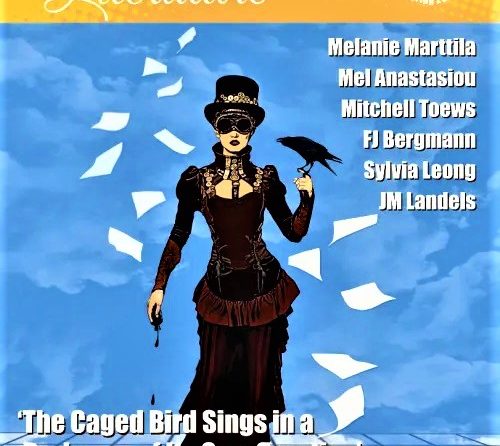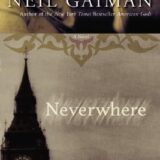
OBIR: Occasional Biased and Ignorant Reviews reflecting this reader’s opinion.

NEO-OPSIS SCIENCE FICTION MAGAZINE issue #29, Winter 2018.
Editor: Karl Johanson. Art Director and Assistant Editor: Stephanie Johanson.
Mayathan Rainbows by Sarah Craft.
Premise:
A synthetic meat chef operating a hole-in-the-wall restaurant aboard a deep space station is challenged to serve a particular alien food legendary for its taste and iridescent colours. Trouble is no one knows its ingredients or how it is prepared.
Review:
Logic, based on known circumstances, helps move the chef partway toward the solution, but given the alien race in question is the least known of all the races visiting the station, communication with them awkward, their motivation incomprehensible, the conundrum seems well nigh unsolvable. A good, old-fashioned space mystery I would say. Raises the point that difficulties in relations between star-faring species aren’t restricted to high level diplomacy. Just trying to get a decent snack can be a problem. Fun story.
Dragon Creed – by J. M. Dover
Premise:
Dragons live fulltime as humans to avoid extinction at the hands of the human race. Bit of a problem when one dragon decides to “come out.”
Review:
Struck me as a variance on the “Dr. Jekyll and Mr. Hide” theme. Imagine if Dr. Jekyll had everything under control, only to discover someone else had discovered the formula and needed to be stopped before Jekyll himself was unmasked. Raises issues of self-control and community needs. Definitely an original approach to the problem of being a dragon.
King of the Belt – by Richard Wren
Premise:
James is an asteroid belt miner in an era when AI and bio-engineered life do most of the heavy lifting. What happens when both AI and Bio-life evolve beyond expectations?
Review:
Hint: the cover depicts one of the useful attributes of bio-life. Good, old-fashioned human shenanigans confronted by a slap-in-the-face wakeup call told with touches of subtle humour. Very much in the tradition of Clarke or Asimov. I enjoyed it.
A Matter of Nurture – by August von Orth
Premise:
Dani is a hit-woman surprised to learn her next target knows more about her than she does.
Review:
A many-layered P. K. Dick-style revelation quest dependent on seemingly plausible advances in certain areas of medical science. Kind of a creepy warning about the consequences of such, but I couldn’t help rooting for Dani to find out who she really is … and where she belongs.
Project Victoria – E. J. M. Smith
Premise:
The first test of a matter transmission between Mars and Earth goes awry.
Review:
I’m a sucker for any story taking place in tunnels beneath the surface of Mars. I also like stories where what happens is totally unexpected. The conclusion is open-ended, but satisfying. Liked this story quite a bit.
Tammy Tock and the Turnkey Monkey Man – by Harding McFadden
Premise:
A small child bereft of memory and an even smaller robotic monkey flee across a post-apocalyptic landscape pursued by people determined to destroy them.
Review:
Ordinarily, starting off the main character in a state of amnesia is the kind of cliché editors look for as an excuse to reject, but this surreal story is so rich in vivid description and puzzlement that it draws the reader in. Even better, it eventually opens into the kind of vista that would make Olaf Stapledon smile. Very cool.
Dragon – by David Desjardins
Premise:
A Dragon asleep for eons is discovered by two small boys in a modern suburb.
Review:
Two entirely different realities suddenly occupy the same space and time. Neither understands the other’s point of view. Coping with the clash of situational awareness proves impossible. Both sides inevitably react by carrying on true to themselves. No doubt there’s a lesson to be learned but mainly the story is just a heck of a lot of fun.
CONCLUSION:
This issue, typical of the magazine, features an impressive variety of fiction which makes for interesting and entertaining reading. Throw in Editor Karl Johanson’s ongoing non-fiction series “A Walk Through the Periodic Chart” (in this case an explanation of where “Beneath the Planet of the Apes” (1970) went wrong and “Goldfinger” (1964) got it right in terms of utilising Cobalt as a weapon) plus assorted reviews and SF news, and you’ve got a magazine well worth subscribing to.
Check it out at: Neo-Opsis
——

A BODY OF WORK Anthology – by Colleen Anderson
Published by Black Shuck Books, U.K. 2018
First section titled “Mind Over Matter.”
The Collector
Premise:
A young woman knows how to cheat the Grim Reaper when he shows up for her husband. Trouble is this really annoys Death’s partner whose job is to complete the harvest. There are nasty consequences.
Review:
An idyllic village setting is quickly transformed into a riveting battle of wills. But which is worse? Defeat? Or victory? Nothing simple in life, or death, it seems. Interesting conundrum.
The Blade
Premise:
A sentient sword is found by a young girl. Patiently, the sword teaches the child how best to use the sword as she grows into a renowned battle maiden. But what is a sword to do when a warrior tires of war?
Review:
Best story told from the point of view of a sword I have ever read. I am quite serious. It really captures the bonding between a skilled fighter and the weapon of choice. If your weapon is a “stranger,” i.e. not part of your instinct and training, you won’t last long in battle. The story makes this point remarkably well, yet, at the same time, demonstrates there is more to life than taking life.
Shaping Destiny
Premise:
Nerissa has always resented being Rom, resented being a fortune teller, and most of all, resented not only seeing the future but determining the future.
Review:
The story reveals that the only thing worse than being a fraud is not being a fraud. How does a fortune teller cope with the moral quandary of deciding which is the least worst fate for her clients, especially when she is not gifted enough to see the ultimate consequences of her choices? If there is such a thing as a genuine fortune teller, this thoughtful study makes me pity them, and makes me glad I am not one of them.
Asylum
Premise:
A young woman working on her PHD in Psychology visits the one remaining asylum out in the countryside. Things are not what they seem, or maybe they are.
Review:
As Colleen remarks in her introduction, this is a variant of a well-known Poe tale. She provides a very satisfying alternative ending. Even better, her trademark very clear yet vivid writing style makes for a suitably gruesome and creepy atmosphere throughout. West coast readers will be amused to note that “Rockyview Asylum” is a sort of spoof of the notorious “Riverview Asylum” next to the Fraser River. The authorities are thinking of starting it up again, though hopefully not along the lines of Rockyview. I greatly enjoyed this story.
Gingerbread People
Premise:
An urban variation of Hansel and Gretel, only grimmer. A brother and sister become homeless, become typical street dwellers sinking into prostitution and drugs, and eventually become addicted to violence as well.
Review:
A painful and powerful story, essentially an exploration of “the sociopath mindset” as Colleen puts it. I normally avoid stories like this because, despite the symbolism and metaphors embedded in the text, it is fundamentally about the reality of evil and that is a concept I find truly depressing. I prefer fun monsters and villains over true-to-life villains. The former are entertaining; the latter rather terrifying. I find this story disturbing. If you are into well done fictional depictions of the worst of what humanity has to offer, you will be impressed. It is an excellent cup of tea; just not my cup of tea.
A Book by its Cover
Premise:
Interactive TV has become truly immersive. Syntia performs on the fringes, but is obsessed with perfecting her living image in the hope of becoming a star. How perfect does she need to be to obtain her goal?
Review:
The story implies that success in the fashion/club/celebrity scene depends on a supremely disciplined narcissistic situational-awareness constantly adjusted to chameleon-like effect. No wonder famous personalities often struggle to keep track of who and what they really are. Syntia thinks she is quite objective about the sacrifices she is prepared to make. She has no idea what true sacrifice means but quickly learns. Very much a modern horror story. What good is ambition if you succeed?
Red is the Colour of my True Love’s Blood
Premise:
A young woman drops by the apartment of her lover to cook him a tasty dinner, but something is not quite right.
Review:
More of a vignette than a story, it’s about two people hyper-sensitive to colour but in contrasting ways. She’s a professional photographer-artist; he researches the meaning and mythology of colour, particularly the colour red. Just how meaningful and “real” is symbolism anyway? Turns out a whole lot. The evening become more memorable than she intended.
Tasty Morsels
Premise:
A wealthy, handsome CEO named Hwulf, a name recognized throughout the solar system, stalks an aloof, very private and extraordinarily beautiful young woman named Red around whom dark rumours swirl.
Review:
Very much a science fiction take on the well-known fairy tale. Also an interesting study of the subtle differences between wooing and stalking. Where does one begin and the other leave off? In this case cynicism and trophy hunting make Hwulf’s intentions clear; he sees his quest as merely his biggest challenge to date. Red, on the other hand, has her own agenda in mind. Lust, though often overwhelming, is never in control. Lovers beware.
Second section titled “Under the Skin.”
Taste of Eden
Premise:
Genevieve Dupuis is justly praised by Kaiser Wilhelm II for fashioning a wonderfully bejeweled grove complete with marvelous animal automatons. Then disaster strikes, a competitor, Mita, introduces uncannily life-like automata that delight the Emperor more. Genevieve risks everything to discover Mita’s secret.
Review:
Art for the sake of beauty and a career is one thing. Art as a means to an end for the sake of acquiring power is quite another. At what point is art a threat? Beauty dangerous? At what point does art betray its creator? Fascinating story.
Season’s End
Premise:
What happens when the Green Man is locked into a cycle of decay and can no longer regenerate himself or the world? What’s the Mother to do? Especially when both are trapped in the modern world where myth and magic have gone missing?
Review:
A melancholy tale rich in mood-evoking detail and description. It’s all about the one thing the modern world sorely lacks, regeneration. Powerful lesson.
The Brown Woman
Premise:
This particular Earth Goddess is confined to the vegetation flourishing on a strip of dirt between the paved lanes of a highway. Her natural world cycles as it should, but what threat does the dying body of a furless one collapsed on her soil represent? How should she respond to its presence?
Review:
Increasingly in the minds of men nature has become a kind of pet/servant/slave. Nature untrammelled has become anathema to us. Best it be restricted and tamed, or destroyed where deemed necessary. Yet, left to its own devices, it can be exactly what we need. This story suggests it is not too late.
Symbiosis
Premise:
Keela is one of twenty remaining scientists from an expedition to what had originally seemed a harmless, pastoral planet. One by one they are falling prey to highly efficient predators. How to survive till the next ship comes in three years time?
Review:
Of course, humans know well the law of the jungle and often revert to it with delight. But when becoming a proficient hunter proves insufficient? What then? How to cope? It would take a miracle or, perhaps, something unique to the environment? Turns out there’s more than one way to benefit from skinning a cat.
Exegesis of the Insecta Apocrypha
Premise:
The Insecta religious writings appearing on the internet document the growing obsession of a young girl with the function and purpose of insects, ultimately resulting in her gifting them with conscious intelligence.
Review:
As someone plagued by an extreme phobia of insects throughout much of my early life, this story creeped me out more than most readers would be, I imagine. I tolerate insects now, and hope they tolerate me, but I’ll be damned if I want to see insecta and humans merge as this story suggests may be inevitable. One way to combat the rise of AI I suppose. A VERY disturbing horror story.
Sins of the Father
Premise:
The daughter of a serial killer develops the ability to overwhelm evil people with the strength of her hate and guilt. But then she runs into a real monster impervious to her power because it operates solely on instinct rather than perverted emotion.
Review:
On one level this is a distinctly Lovecraftian tale with a strong fungoid tinge that is very satisfying as such. It is even more frightening as a modern parable to do with how easily hate and guilt can warp perceptions and ruin lives. A grim lesson indeed.
The Healer’s Touch
Premise:
Hela is an empath nanotech surgeon who uses her mind to instruct nanobots how and where to heal. Trouble is, when confronted with refugees haunted by their past experiences of abuse and torture, her healing powers become compromised.
Review:
No matter what god-like powers technology gifts us we remain human and vulnerable. This is both a curse and a blessing.
The Book with No End
Premise:
Lisbet is an archaeologist who makes the discovery of a lifetime in the ruins of Nippur, a human skin on which are written clues to the secret of immortality. She spends the remainder of her life seeking that goal, no matter what the cost.
Review:
I am also a sucker for anything to do with ancient history and archaeology. The monomaniacal obsession of this fictional archaeologist is not all that farfetched. This kind of absurdly focused concentration of mind and purpose can be found in many professions. Colleen may be correct in implying it is a trait typical of sociopaths.
CONCLUSION:
Colleen is a well known Canadian anthology editor and author. In this collection of her own works she pursues a theme of “Be careful what you wish for” or perhaps “Nothing fails like success.” She explores myriad complexities of the human mind as if our very souls are at stake, and maybe they are. Nothing dull or simple in these dark and weird stories. Be aware some of what takes place may be too dark for your taste. Unpleasant even. But often that is what is revealed when the hidden recesses of the mind are examined. Thought provoking stuff. Grim and powerful.
None of her characters are generic or shallow. They all possess unusual viewpoints, curious obsessions and weird sensitivities. Unique, every one of them. Genuine individuals. You may not identify with the worst of them (at least, I hope not!), but will find all of them fascinating.
What I like best is the power of her description. Her writing is clear and precise, full of evocative detail, with many a telling phrase that hits the nail exactly on the head. This has the effect of bringing a vivid immediacy to the atmosphere of her stories which renders every reader a witness and voyeur unable to turn away or break the spell being weaved. Darn good read, I say.
In addition I recommend this anthology to any beginning writer who wants to know how to write superbly well.
You can find the book here: A Body of Work










